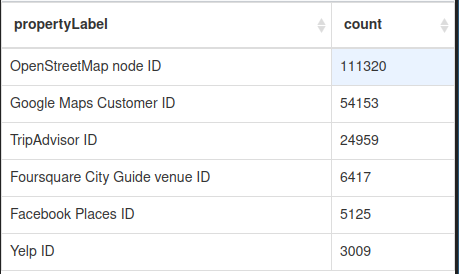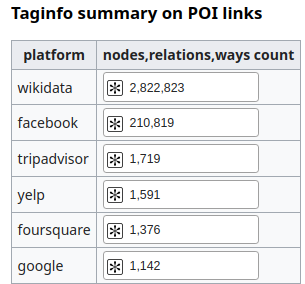I saw the option to adding rating to OSM, like discussed in Ratings for POI's? - OSM Help
I am not thinking about adding rating or reviews directly and I agree with and understand the guideline “do not add subjective information to OSM”
I am thinking about adding link to third-party descriptions/rating/reviews database/websites
(like discussed in [Tagging] contact:* for review websites)
i.e.
amenity=restaurant
reviews:<platform1>=<url1>
website=<url2>
where url1 has to match platforms domain names or be without platforms domain names
in order to limit the scope of what can be included in this tag.
My first guess about the platform to use was:
which was already tightly integrated with OSM and some clients (like OSMAnd)
but apparently is now marked as discontinued (June 2023).
I saw there ware some mention about adding links in the contact:* namespace to “multi-purpose” big online platforms which are considerably inconvenient for multiple reasons:
- Google Maps (wki): i.e. POIs are not easily addressable
- Facebook (wiki): i.e. it requires login
- Bing Maps (wiki)
Maybe a better option would be companies more specifically dedicate to provide information about POI like the usually mentioned three which have been already being referenced in the namespace contact:*:
- Tripadvisor (wiki),
contact:tripavisor(taginfo) - yelp (wiki),
contact:yelp(taginfo) - foursquare (wiki),
contact:foursquare(taginfo)
Regarding POIs offering food, I recently find out about:
which is quite easily accessible and has decent amount of information (at least for Europe), it also has prices for single items in menù sometime.
There are also more open and more general options (but also with fewer contents)
Is the main argument against this key in the line of the following statement?
… adding a lot of tag
containing the pages that talk about this poi makes no sense
and look like seo spam.
I think this can be mitigated by recommending the use of a curated list of such review platforms,
can this data belong to OSM?
NB: not sure if I found all place this topic was already discussed in other threads/pages

